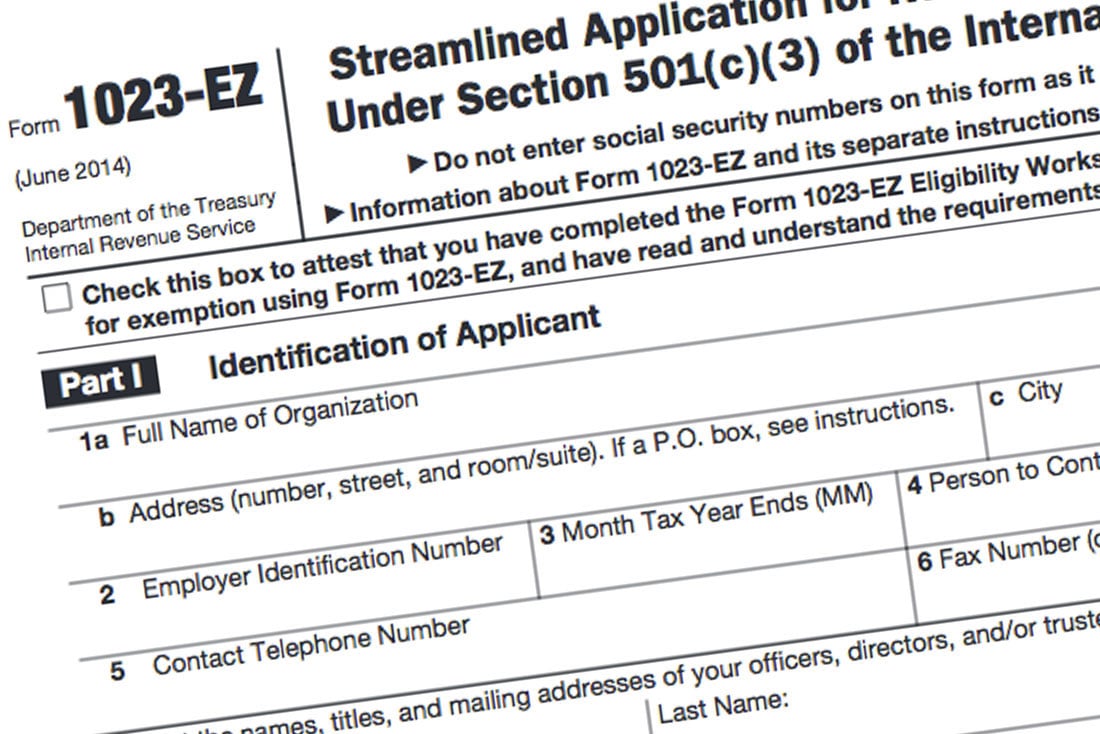In July 2014 the IRS released a new, easier version of Form 1023, Application for Recognition of Exemption Under Section 501(c)(3) of the Internal Revenue Code.
Section 501(c)(3) is the tax-exemption status for nonprofit organizations that operate solely for one of the following purposes:
- religious,
- charitable,
- scientific,
- literary,
- education,
- testing for public safety,
- to foster national or international amateur sportscompetition,
- or for the prevention of cruelty to children, women, or animals.
The original form 1023 is a 26-page application for recognition as a tax-exempt 501(c)(3) organization. Submitting this form is a lengthy/cumbersome process of applying for an exemption with the IRS. The review process for these applications can take up to a year with additional requests for information commonly being made upon review completion.
However, the new form 1023-EZ is a streamlined improvement of the longer form 1023 and certain 501(c)(3) organizations are eligible to file this form instead of its cumbersome alternative. Thus making the process for forming a charitable organization more appealing.
How to determine eligibility to use 1023-EZ:
To determine if an organization is eligible to file this shorter exemption application, they must complete the worksheet found on pages 11-12 of the form instructions. If the organization answers “yes” to any of the eligibility questions, they are not eligible to file the shorter 1023-EZ and must file Form 1023 instead.
The following are examples of considerations that may or may not qualify an organization
- Size:
- If your organization has gross receipts of $50,000 or less and assets of $250,000 or less, it’s likely eligible.
- If your organization has gross receipts over $50,000 and assets of more than $250,000 it is required to file Form 1023.
- Purpose: Charities set up for certain purposes may not use the short application. Some of the more common 501(c)(3) organizations that are not eligible to use 1023-EZ are:
- Churches & church associations
- Schools, colleges & universities
- Hospitals & medical research organizations
- Organizations maintaining one or more donor advised funds
Note that applicants must state the organization’s purpose and activity on form 1023-EZ. For a full list of ineligible purposes, please see the instructions for Form 1023-EZ.
- Other examples of applicants ineligible for form 1023-EZ:
- Limited liability companies
- Organizations that have been revoked because of terrorist activity or connections
- Successor to for-profit entities
- Organizations that have had their 501(c)(3) status revoked for any reason
- Organizations that had their tax-exempt status revoked for failure to file any version of Form 990 for the past 3 years if they are seeking retroactive reinstatement
- Organizations that wish to be a private operating foundation
Words of Caution
A 2015 report by the Tax Exempt and Government Entities department of the IRS indicated that 37% of a representative sample of 2014-2015 Form 1023-EZ applicants were not legally qualified 501(c)(3) organizations. Criticism indicates that these organizations unknowingly put themselves at major risk if they're audited.
You may be wondering how these organizations could be at risk if the IRS had, in fact, approved their "Streamlined Application for Recognition of Exemption Under Section 501(c)(3) of the Internal Revenue Code."
When reading the Instructions for Form 1023-EZ on page 3 you may notice the following under the heading "Specific Instructions":
"By checking the box, you are also attesting that you have read and understand the requirements to be exempt under section 501(c)(3)."
By checking the box at the top of form 1023-EZ you are assuming the responsibility for understanding whether or not your organization is elligible for Recognition of Exemption Under Section 501(c)(3) of the Internal Revenue Code. Therefore, you're at fault if your organization is later audited by the IRS and turns out to have not been eligible (despite having successfully filed form 1023-EZ).
We, therefore, strongly advise that if you don't feel 100% confident that your organization is properly eligible that you contact your attorney for clarification.
To file Form 1023-EZ
- Make sure you follow the Instructions for Form 1023-EZ.
- Make sure you understand the Purpose of the form.
- Make sure you understand who can file this form, and fill out the "Form 1023-EZ Eligibility Worksheet."
- On the first page of the instructions click on the link that reads "Form 1023-EZ Eligibility Worksheet." Fill out the worksheet.
- Follow the rest of the instructions carefully.
- Note that the User Fee is $275.
Overview:
- Released by IRS in July of 2014.
- Less complicated than form 1023.
- In theory, will allow for faster approvals.
- Only costs $275 to submit.
- Organizations MUST BE ELIGIBLE.
- Applicants assume responsibility for understanding if their organization is properly eligible.
- Legal organizing document must include all language required by Internal Revenue Code section 501(c)(3).
- IRS may randomly request to review the document.
Explore our other blog post(s) regarding Nonprofits:

